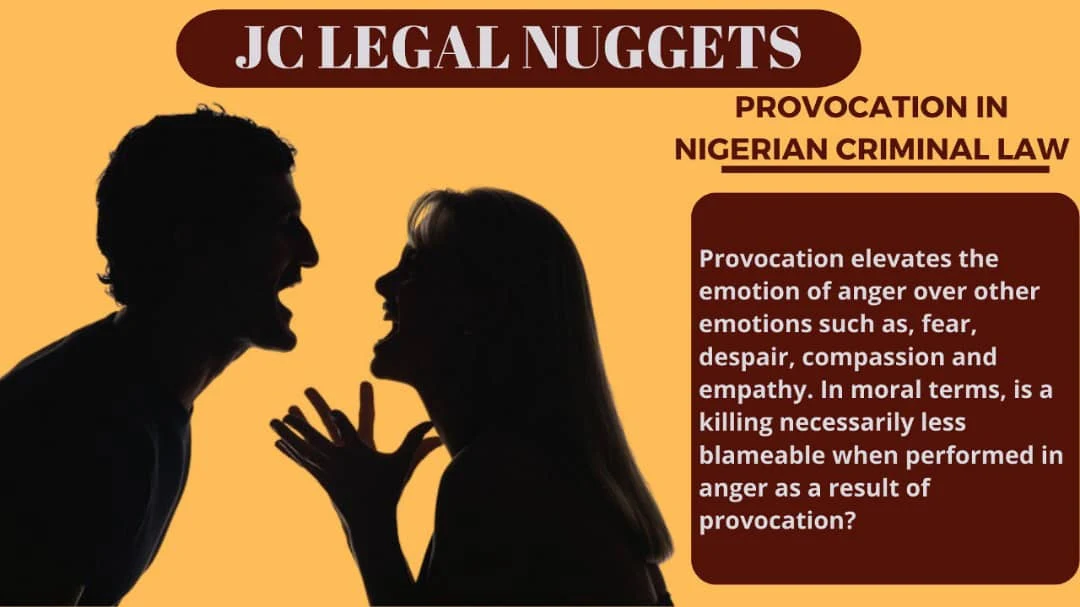Black's Law Dictionary defines provocation as ” Such conduct or actions on the part of one person towards another as tend to arouse rage, resentment or fury in the latter against the former,”.
Provocation is one of the defences that may be raised in a criminal trial, It is a defence often raised by the accused person when charged with murder. The Supreme Court in the case of Obaji v State held that section 318 of the Criminal Code Act should be read alongside with section 283 of the Criminal Code Act which says not every provocation will cause an individual to lose self-control and take their life
The defence of provocation is a partial defence to assault and homicide and the plea of provocation is founded on loss of both self-control actual and reasonable and is found in Section 318 of the Criminal Code. The defence of provocation has been described as “the partial mitigation of culpability which arises from some wrongful act or insult of such a nature when done to an ordinary person as is likely
- To deprive him of the power of self-control and
- To induce him to assault the person by whom the act or insult was committed".
The defence of provocation as provided by Nigerian criminal law is available in both murder and manslaughter. There is a combination of subjective and objective elements in the plea. The defence of provocation is raised by an accused mostly in homicide cases in relation to murder and manslaughter. Provocation under Section 318 of the Criminal Code Act is to the effect that a person is guilty of manslaughter only if he unlawfully kills another in circumstances which would otherwise have constituted murder so far it is done in the heat of passion caused by sudden provocation and before there is time for his passion to cool. Thus, before the defence of provocation can avail a person, the test to be applied is to see what effect the act or series of acts of the deceased would have on a reasonable man, so that an unusually excitable person will not be able to rely on it as a defence to the charge unless the provocation was such as to have led an ordinary person to act in the way the accused did. In Nigeria, provocation is one of the defenses that may be raised in criminal trial. In the Nigerian criminal law system, it is commonplace that no amount of provocation can ground an acquittal in a criminal trial. This position is affirmed basically on the belief that no amount of anger should make a man take the life of another person.
Provocation is often a mitigating factor in sentencing. It rarely serves as a legal defense, meaning it does not stop the defendant from being guilty of the crime. It may, however, lead to a lesser punishment. The defence of provocation is raised by an accused mostly in homicide cases in relation to murder and manslaughter.
Provocation in itself is a subject left to the discretion of the Court because whether or not an act amount to provocation cannot be determined except in the context of the case as it is presented before the Court. In the Nigerian case of Abbas Muhammad v The State, the Court stated that: 'it is also settled that words can constitute provocation but this depends on the actual words used, and what they mean to a reasonable person having a similar background with the accused person…’
The law of provocation has been the subject of much criticism both locally and in other common law jurisdictions considering that specific triggering circumstances must exist before an offender's characteristics may be taken into account for the purpose of determining the impact of the insult or provocative conduct, as well as the proper course of action for the court when such alleged characteristics are present.
If a person is charged with murder or manslaughter, provocation can serve as a partial defense for which there must be evidence presented to prove that he did not intend to kill his victim. It is important to note though that this defence should not be used too liberally because if used excessively.


Post a Comment